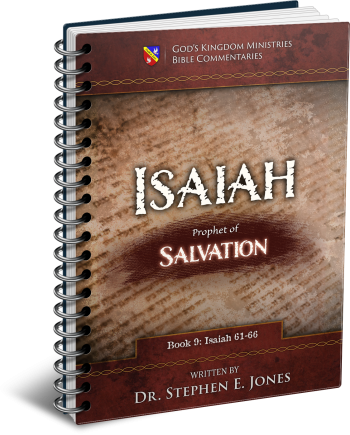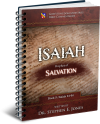Latest Posts
View the latest posts in an easy-to-read list format, with filtering options.

Isaiah is the prophet of Salvation. He is also known as the truly "Universalist" prophet, by which is meant that He makes it clear that salvation is extended equally to all nations and not just to Israel. He lived to see the fall of Israel and the deportation of the Israelites to Assyria, and he prophesied of their "return" to God (through repentance). He is truly a "major prophet" whose prophecies greatly influenced the Apostle Paul in the New Testament.
Category - Bible Commentaries

Isaiah 62 begins with the prophet’s determination to prophesy until God’s New Covenant promise is fulfilled. The New Covenant, of course, was to develop gradually over a period of thousands of years, extending far beyond Isaiah’s lifetime. Nonetheless, he spoke for his successors among the prophets, those who are given the revelation of the New Covenant and the assurance that God is able to do what He has promised, in spite of the will of man.
Isaiah 62:1 begins,
1 For Zion’s sake I will not keep silent, and for Jerusalem’s sake I will not keep quiet, until her righteousness goes forth like brightness, and her salvation [Yeshua] like a torch that is burning [ba’ar, “burning, consuming”].
The prophet used two couplets here for emphasis. First, we see the parallel between “I will not keep silent” (khasha) and its restatement, “I will not keep quiet” (shakat). Second, he sets forth the goal of the New Covenant, which must be preached continually until it succeeds.
First, “her righteousness goes forth like brightness.” This is then restated as “her salvation like a torch that is burning.”
Here “her righteousness” runs parallel to “her salvation,” that is her Yeshua. We see that righteousness is equated to salvation (Yeshua). Paul tells in 1 Cor. 1:30,
30 But by His doing you are in Christ Jesus, who became to us wisdom from God and righteousness and sanctification and redemption.
He is our righteousness, and for this reason Martin Luther spoke of it as an alien righteousness. He meant that such righteousness was not inherent in us (at this time) but rather Christ’s righteousness had been imputed to us—as if it were our own. This truth was given to him by studying Romans 4, the great chapter explaining the imputation of righteousness. It was this revelation that sparked the Protestant Reformation five hundred years ago.
So when Isaiah equates or compares righteousness to Yeshua, this is likely the source of Paul’s understanding of the righteousness of Christ being imputed to us by faith. But this is not merely an individual matter. Isaiah also spoke of a collective fulfillment in terms of “Zion” and “Jerusalem.” Zion refers to God’s government—specifically the government of David and his kingdom. Jerusalem refers to the people as a whole.
As we will see shortly, Zion and Jerusalem are also pictured in a marriage relationship between the Head and the Bride. Hence, not only has God promised to give us righteous government but also produce a righteous people. Isaiah pictures the righteous shining “like brightness” and “like a torch that is burning” (full of the consuming fire of God).
Exodus 24:17 says,
17 And to the eyes of the sons of Israel the appearance of the glory of the Lord was like a consuming [akal] fire on the mountain top.
The word akal has a similar meaning as Isaiah’s term, ba’ar. Fire consumes the flesh, and so it is a symbol of the Holy Spirit as well, which burns “chaff” (Matt. 3:12). When the work of the Spirit is complete in our lives, the righteousness of Christ will be infused into us by nature, because then the “fiery law” (Deut. 33:2, KJV) will be written in our hearts.
The righteousness of Christ (our Head) was seen visually in His transfiguration (Matt. 17:2). We too have this promise, for as Paul says in 1 Cor. 15:51, 52, “we will not all sleep, but we will all be changed in the atoms [Greek: atomos] in the twinkling of an eye at the last trumpet.” This is the promise of the New Covenant which Isaiah was determined to preach without ceasing.
Jeremiah prophesied a century after Isaiah. He may have had an independent revelation of this promise of God, but it seems certain that he also had a personal copy of Isaiah to study. He wrote in Jer. 23:5, 6,
5 “Behold, the days are coming,” declares the Lord, “when I will raise up for David a righteous Branch [tsemach], and He will reign as king and act wisely and do justice and righteousness in the land. 6 In His days Judah will be saved, and Israel will dwell securely; and this is His name by which He will be called, ‘The Lord our righteousness’.”
The “Branch” is a messianic term used in Isaiah 4:2. In Zech. 3:8 it is applied to the high priest named Joshua (Yeshua), a type of Christ. Jeremiah tells us that “He will reign as king,” that is, as a righteous king full of wisdom. He clarifies this more fully in Jer. 33:14-17,
14 “Behold, days are coming,” declares the Lord, “when I will fulfill the good word which I have spoken concerning the house of Israel and the house of Judah. 15 In those days and at that time I will cause a righteous Branch of David to spring forth; and He shall execute justice and righteousness on the earth. 16 In those days Judah will be saved and Jerusalem will dwell in safety; and this is the name by which she will be called: ‘the Lord our righteousness’.” 17 For thus says the Lord, “David shall never lack a man to sit on the throne of the house of Israel.”
Jeremiah tells us that this “righteous Branch” will be of the seed of David in order to fulfill the promise that David would “never lack a man to sit on the throne of the house of Israel.” There are many implications of this, including the fact that this could be fulfilled only when the house of Judah was united with the house of Israel. For anyone to truly understand this prophecy, one must know the difference between Israel and Judah and understand their distinct callings.
Jeremiah says that “Jerusalem” will be called Yahweh-Tsidkenu, “The Lord our Righteousness.” Why would Jerusalem need a new name? Why was this important? What did it mean? First, Jerusalem was supposed to be the “City of Righteousness” (Isaiah 1:26), but its worship of Molech had turned it into “the bloody city,” or the City of Blood (Ezekiel 22:2; 24:6, 9; Nahum 3:1). Hence, it needed a new name/nature.
We know, of course, that Jerusalem (Ierushalayim) literally means “two Jerusalems.” The earthly Jerusalem, which Paul calls “Hagar,” produces children of the flesh who persecute the promised seed (Gal. 4:29), even as Paul persecuted the church prior to his conversion. Likewise, Jerusalem persecuted all the prophets (Matt. 23:37).
The earthly Jerusalem, then, continued to be the City of Blood, while the New Jerusalem was raised up as the true City of Peace. This is the city whose name/nature is Yahweh-Tsidkenu. This is the city that Paul said is “our mother” (Gal. 4:26). Hence, we, “like Isaac, are children of promise” (Gal. 4:28). As children of the New Covenant, we are the true inheritors, having Yahweh-Tsidkenu as our very nature.
Isaiah 62:2 says,
2 The nations will see your righteousness, and all kings your glory; and you will be called by a new name which the mouth of the Lord will designate.
The prophet does not tell us this “new name.” This remained obscure for another century, when Jeremiah learned it by inspiration: Yahweh-Tsidkenu, “The Lord our Righteousness.” Yet Isaiah linked this new name to Yeshua-Jesus in the previous verse, who is also said to be our righteousness. Therefore, we can find no contradiction between the two prophets. There is only a progressive revelation as the word is clarified over time.
This is why it is important to read all of the prophets. Further, we must know the Scriptures well enough to see the unfolding of revelation, not only from one prophet to another but also in the gospels and epistles. Whereas Isaiah and Jeremiah only saw Christ from afar, the New Testament writers offer a quantum leap in understanding. The apostles had a personal experience with the Mediator of the New Covenant and thus received a greater level of revelation.
Unfortunately, much of that New Covenant revelation was lost in later centuries, as the carnal minds of religious men fell back into Old Covenant patterns of thought. But we who live at the end of the Age of Pentecost, we who expect to inherit the coming Age of Tabernacles, have again received the revelation of the New Covenant.
Instead of resting our salvation upon our own will and our own vows/decisions, we know that our salvation rests upon the will of God and His vow/decision. For this reason, success is guaranteed, for it depends fully upon God’s ability to change our hearts and to give us understanding of justification, sanctification, and glorification through the three main feasts of the Lord.